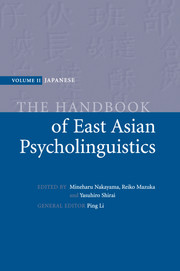Book contents
- Frontmatter
- Contents
- List of figures
- List of contributors
- In memory of Miwa Nishimura
- Preface
- Introduction
- Language acquisition
- Part II Language processing
- 26 The phonetic and phonological organization of speech in Japanese
- 27 Speech segmentation by Japanese listeners: its language-specificity and language-universality
- 28 Prosody in sentence processing
- 29 Speech errors
- 30 Effects of word properties on Japanese sentence processing
- 31 Orthographic processing
- 32 Lexical access
- 33 Incrementality in Japanese sentence processing
- 34 Processing alternative word orders in Japanese
- 35 Processing relative clauses in Japanese: coping with multiple ambiguities
- 36 Processing empty categories in Japanese
- 37 The difficulty of certain sentence constructions in comprehension
- 38 Reading and working memory
- 39 Sentence production in Japanese
- 40 The neural basis of syntactic processing in Japanese
- 41 The competition model
- 42 Connectionist models
- 43 Computational linguistics
- 44 Language and gesture as a single communicative system
- References
- Name index
- Subject index
30 - Effects of word properties on Japanese sentence processing
from Part II - Language processing
Published online by Cambridge University Press: 05 June 2012
- Frontmatter
- Contents
- List of figures
- List of contributors
- In memory of Miwa Nishimura
- Preface
- Introduction
- Language acquisition
- Part II Language processing
- 26 The phonetic and phonological organization of speech in Japanese
- 27 Speech segmentation by Japanese listeners: its language-specificity and language-universality
- 28 Prosody in sentence processing
- 29 Speech errors
- 30 Effects of word properties on Japanese sentence processing
- 31 Orthographic processing
- 32 Lexical access
- 33 Incrementality in Japanese sentence processing
- 34 Processing alternative word orders in Japanese
- 35 Processing relative clauses in Japanese: coping with multiple ambiguities
- 36 Processing empty categories in Japanese
- 37 The difficulty of certain sentence constructions in comprehension
- 38 Reading and working memory
- 39 Sentence production in Japanese
- 40 The neural basis of syntactic processing in Japanese
- 41 The competition model
- 42 Connectionist models
- 43 Computational linguistics
- 44 Language and gesture as a single communicative system
- References
- Name index
- Subject index
Summary
Introduction
Psycholinguistic research on lexical processing has demonstrated that certain properties of words, such as word frequency or age of acquisition, correlate with significant differences in how humans process individual lexical items. It is widely assumed that such lexical properties should also have important consequences for how humans process a sentence in which an individual lexical item is embedded. Recent publication of the Nihongo-no goitokusei (Lexical Properties of Japanese) database series (Amano & Kondo, 1999a; 1999b; 1999c; 2000; Kondo & Amano, 1999a; 1999b; 1999c) has provided the most comprehensive study to date of a number of lexical properties in the Japanese language. Yet little research exists concerning how these properties are reflected in sentence processing. In this chapter, we will first describe the main findings of the Nihongo-no goitokusei database. We will then discuss a recent study in which we investigated how two specific lexical properties – word familiarity and orthographic plausibility – interact with the processing of Japanese sentences.
Lexical properties of Japanese
The database series Nihongo-no goitokusei (see references above) was constructed to provide a comprehensive source of Japanese lexical properties for psycholinguistic research in the Japanese language. These databases were designed with the following key features:
(a) Contains a sufficient number of words to provide a comprehensive pool of lexical items from which stimuli can be selected for psycholinguistic experiments.
(b) Includes data regarding various properties, both lexical and orthographic, including critical data about a number of properties for kanji (Chinese) characters.
(c) The data reflect, with reasonable reliability, the contemporary daily life of Japanese native speakers.
- Type
- Chapter
- Information
- The Handbook of East Asian Psycholinguistics , pp. 226 - 232Publisher: Cambridge University PressPrint publication year: 2006

